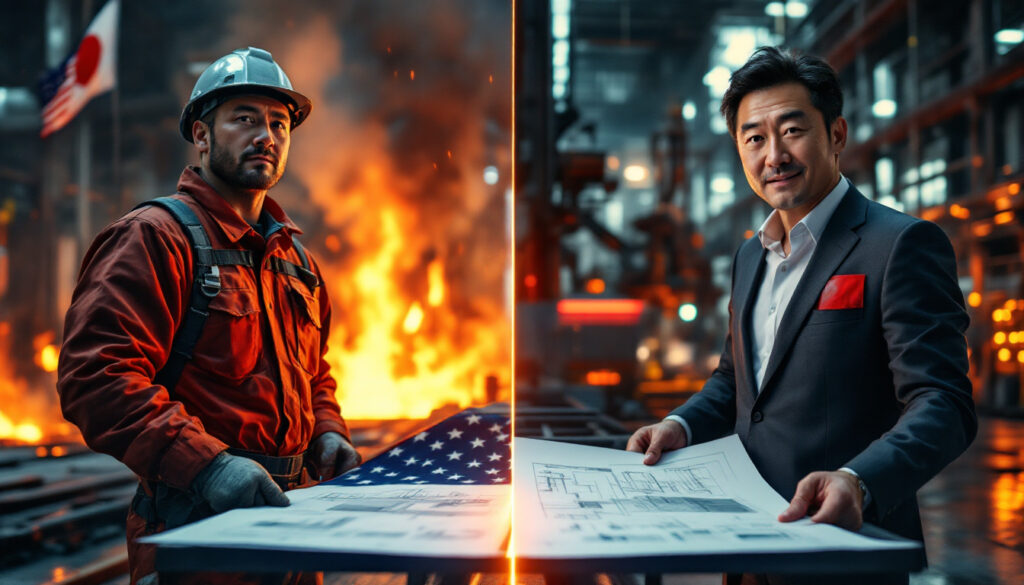Trump's U.S. Steel Position: Implications for National Security and Trade
The proposed $14.1 billion acquisition of U.S. Steel by Japan's Nippon Steel has become a flashpoint in American politics, with former President Donald Trump taking a firm stance against foreign ownership of this iconic American company. This deal, which offered a substantial 40% premium over U.S. Steel's stock price, initially seemed to be progressing through regulatory channels before facing unexpected opposition from Trump, triggering significant market volatility dynamics and raising questions about America's trade relationships and industrial policy.
What Is Happening with U.S. Steel and Nippon Steel?
In December 2023, Nippon Steel announced its intention to acquire U.S. Steel in an all-cash deal valued at $14.1 billion. The Japanese steelmaker's proposal emerged after U.S. Steel had put itself up for sale following an unsolicited $7.3 billion offer from domestic rival Cleveland-Cliffs. Nippon Steel's bid represented a significant premium and was unanimously approved by U.S. Steel's board of directors.
Initially, the Biden administration indicated the acquisition would undergo standard regulatory review through the Committee on Foreign Investment in the United States (CFIUS), which examines national security implications of foreign investments. However, the situation grew complicated when former President Trump, campaigning for reelection, issued statements strongly opposing Japanese ownership of U.S. Steel.
Trump's position evolved dramatically over just a few days. On Monday, his administration directed a national security panel review of the acquisition, suggesting a process-oriented approach. By Wednesday, Trump had shifted to categorical opposition, declaring: "We don't want U.S. Steel to go to Japan. I want it to stay right here in the United States."
Why Is Trump Against the Japanese Acquisition?
Trump's opposition stems primarily from national security concerns and his longstanding "America First" trade philosophy. He considers U.S. Steel a "very special company" with strategic importance to American defense and infrastructure. Founded in 1901 by industrial titans including J.P. Morgan and Andrew Carnegie, U.S. Steel has long been viewed as a symbol of American industrial might.
The company supplies approximately 20% of specialized steel needed by the Department of Defense, including materials for armor plating and naval vessels. This critical role in defense supply chains forms the basis for national security arguments against foreign ownership.
The stance also aligns perfectly with Trump's broader protectionist approach to trade policy. During his previous administration, Trump imposed 25% tariffs on steel imports under Section 232 of the Trade Expansion Act, citing national security concerns. His opposition to the Nippon Steel deal represents a continuation of policies designed to shield American manufacturers from foreign competition and preserve domestic manufacturing jobs.
Political considerations likely factor into Trump's position as well. The U.S. steel industry employs approximately 140,000 workers, with significant concentrations in Pennsylvania and Ohio—crucial battleground states for the upcoming election. By opposing foreign acquisition of a storied American company, Trump reinforces his appeal to blue-collar voters in these regions.
How Has the Market Reacted?
The financial impact of Trump's opposition was immediate and significant. U.S. Steel shares plummeted 16% after Trump's comments, representing approximately $2.1 billion in lost market capitalization. This dramatic drop underscores the market's assessment that Trump's opposition substantially increases the likelihood of the deal being blocked.
Interestingly, shares of domestic steel competitors like Nucor saw gains of over 4%, suggesting investors anticipate protectionist policies might benefit purely American steel producers. This rotation of capital within the sector highlights the market's quick adjustment to potential policy shifts.
The contradictory signals from the administration—first indicating a standard review process, then pivoting to outright opposition—have created considerable uncertainty among investors. This regulatory unpredictability extends beyond the steel industry, potentially affecting foreign investment appetite across American manufacturing sectors.
Industry analysts note that this deal represented a significant premium for U.S. Steel shareholders, and its potential collapse raises questions about the company's independent future in a challenging global market where scale and technology investments increasingly determine competitiveness.
What Are the Potential Outcomes for the Deal?
The regulatory pathway for this acquisition now appears increasingly complex. CFIUS reviews typically involve a 45-day preliminary assessment, potentially followed by another 45-day investigation if national security concerns are identified. The committee then makes recommendations, but the President holds ultimate authority to block transactions under the Defense Production Act.
Given Trump's stated opposition, several outcomes remain possible:
-
Complete Rejection: The acquisition could be blocked outright on national security grounds.
-
Mitigation Agreements: CFIUS might negotiate conditions with Nippon Steel, such as appointing American directors, establishing data-sharing restrictions, or maintaining certain production facilities on American soil.
-
Legal Challenges: Nippon Steel could pursue legal remedies under the U.S.-Japan Trade Agreement's investor protections, though such challenges face significant hurdles when national security rationales are invoked.
-
Alternative Structures: The deal might be restructured to address specific concerns, potentially through joint ventures or partial ownership arrangements that maintain American control over sensitive operations.
The United Steelworkers union, which represents approximately 16,000 U.S. Steel employees, has also expressed concerns despite Nippon Steel's pledges to honor existing labor agreements. Their position could influence the political calculus surrounding the deal's approval.
How Does This Fit Into Trump's Broader Economic Strategy?
Trump's opposition to the U.S. Steel acquisition aligns with his broader economic vision focused on revitalizing traditional American industries. During his previous administration, Trump implemented stock market strategies designed to bolster coal, steel, and manufacturing sectors, particularly in states comprising the industrial heartland.
This approach combines nationalist rhetoric with targeted regulatory interventions. For example, Trump recently proposed an executive order to fast-track coal mine permits, echoing 2017 policies that temporarily boosted coal employment. His infrastructure plans emphasize "Buy American" provisions that would benefit domestic steel producers.
The strategy extends beyond steel to encompass what Trump considers strategic resources. His administration previously sought to reduce dependence on China for rare earth minerals critical to defense and technology applications. The MP Materials mining operation in Nevada, for instance, received support as part of efforts to secure domestic supply chains for these materials.
These policies reflect a consistent theme: skepticism toward globalized supply chains and a preference for national self-sufficiency in critical industries. While economists debate the long-term efficacy of such approaches, they undeniably appeal to communities that experienced manufacturing job losses during previous decades of globalization.
What Are the International Trade Implications?
The opposition to Japanese investment in U.S. Steel carries significant implications for international trade relations, particularly with Japan—a longstanding ally and major trading partner.
Trump's statement included the qualification "We love Japan, but…" signaling an attempt to separate this specific transaction from broader bilateral relations. Nevertheless, the Japanese government has expressed concern, with Trade Minister Yasutoshi Nishimura noting that the decision "undermines decades of economic partnership" between the two nations.
Japan accounts for approximately 9% of U.S. steel imports, valued at $3.4 billion annually. The countries have been engaged in ongoing negotiations for expanded digital trade agreements, which now face additional complications due to rising tensions.
From a global perspective, blocking a major cross-border acquisition between democratic allies could set a concerning precedent. If investments from friendly nations face rejection on national security grounds, this could accelerate economic fragmentation and encourage retaliatory measures against American investments abroad.
The World Trade Organization provides dispute resolution mechanisms, and Japan could potentially challenge a blockage under GATT Article XXI, though national security exceptions have historically provided significant latitude for protectionist measures.
FAQ About the U.S. Steel Situation
What Is the Current Status of the Nippon Steel-U.S. Steel Deal?
The acquisition remains under regulatory review while facing significant political headwinds. U.S. Steel's board unanimously approved the $14.1 billion offer in December 2023, but the transaction requires CFIUS approval. Trump's statements opposing Japanese ownership have dramatically increased uncertainty surrounding the deal's prospects, sending U.S. Steel shares tumbling and raising questions about potential modifications to satisfy national security concerns.
How Would This Acquisition Impact American Jobs?
Nippon Steel has publicly committed to honoring existing labor agreements with the United Steelworkers union and maintaining domestic production facilities. U.S. Steel currently employs approximately 22,000 workers globally, with about 16,000 represented by United Steelworkers.
Historical precedents for foreign acquisitions in the steel industry show mixed results. Some foreign owners have maintained or even expanded American operations, while others have reduced capacity over time. Labor unions remain skeptical of long-term job security under foreign ownership, despite formal commitments to preserve existing collective bargaining agreements.
What Other Steel Industry Developments Should Investors Watch?
Beyond this specific acquisition, several industry trends bear monitoring:
The ongoing impact of global overcapacity, particularly from Chinese production, continues to pressure steel prices and profitability. Section 232 tariffs implemented during Trump's previous administration remain in effect, providing some protection for domestic producers despite World Trade Organization challenges.
Infrastructure spending represents a significant demand driver, with Biden's $1.2 trillion infrastructure package emphasizing American-made materials. Technological innovation, particularly in reduced-carbon steelmaking processes, increasingly determines competitive positioning as environmental regulations tighten globally.
The industry faces accelerating consolidation pressures as scale becomes crucial for maintaining cost competitiveness and funding necessary environmental upgrades. Cleveland-Cliffs' previous interest in acquiring U.S. Steel suggests domestic consolidation alternatives may reemerge if the Nippon deal collapses.
Investors should also consider how global commodities insights and geopolitical investment strategies might affect their portfolios as the steel industry undergoes data-driven investment evolution alongside these political tensions.
Looking to Capitalise on Major Mining Discoveries?
Don't miss potentially explosive market opportunities in the ASX exploration sector. Discover how Discovery Alert's proprietary Discovery IQ model delivers instant notifications on significant mineral discoveries, turning complex data into actionable insights for serious investors at https://discoveryalert.com.au/discoveries/.




